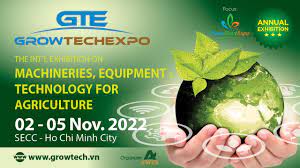- Read all
- Rice
- Fisheries
- Cassava
- Fertilizer & Pesticide
- Coffee
- Animal Feed
- Cocoa
- Seed
- Tea
- Wood
- Pepper
- Agricultural Cooperations
- Cashew
- Agricultural Investments
- Rubber
- Governmental Policies
- Sugarcane
- Agricultural Startup Ecosystem
- Corn
- Technological Innovations
- Spices
- Organic Agriculture
- Bean
- Food Manufacturing
- Fruit & Vegetable
- Agricultural Value Chain
- Flower
- Water & Waste Management
- Meat
- Processed Food
- Dairy
- Plant Originated Products
- General Agro Commodities
- Animal Originated Products
VNSAT PROMOTES THE VALUE CHAIN OF SUSTAINABLE COFFEE PRODUCTION
November 24, 2021

With economic irrigation systems and sustainable farming techniques, coffee in the areas invested by the VnSat Project has significantly improved yield and quality. Photo: Tuan Anh.
As a unit developing according to the model of linking production with product consumption, Ia Mo Nong Agricultural and Tourism Service-Production Cooperative Cooperative (Chu Pah district, Gia Lai province) currently has about 369 affiliate members and more than one 100 non-affiliated members.
With nearly 500 hectares of coffee, this year's coffee yield of the Cooperative is about 4 tonnes per hectare. The total output is about 2,000 tonnes. With the current coffee price fluctuating around VND 41,000-42,000 per kilogram, the cooperative will make a big profit.
Mr. Le Van Thanh, Director of Ia Mo Nong Cooperative, said that the Cooperative had signed a contract with Vinh Hiep Co., Ltd. to consume about 1,000 tonnes of coffee beans and 800 tonnes of fresh coffee.
According to Mr. Thanh, this achievement is thanks to the Vietnam - Sustainable Agriculture Transformation Project (VnSAT Project).
Mr. Thanh said, right when he first established the Cooperative in 2018, and he went to many places to learn several Cooperative development models. Then, knowing that the VnSat project is supporting coffee farmers very effectively, he requested the VnSAT Gia Lai Project Management Board for support.
By the end of 2019, Ia Mo Nong Cooperative was officially supported by VnSat Project to invest in an economical irrigation system in the form of 50/50 reciprocal. For the first time, the VnSat project was funded in 4.5 hectares and found very effective. As a result, the project has supported investment for the Cooperative with 62 hectares of economic irrigation system.

In many areas where the VnSat project has invested in infrastructure and technology transfer, coffee productivity has increased by more than 20% compared to locations outside the project. Photo: Tuan Anh.
The VnSat project also supports training on sustainable coffee production and re-cultivation. Accordingly, all members of the Cooperative are trained on how to grow and care for coffee trees effectively to increase productivity and quality.
Towards a sustainable coffee development model, the VnSat Project continues to support investment for the Cooperative in high-quality coffee processing and preliminary processing equipment. Recently, the project has invested more than 6 kilometers of concrete road going to the coffee production area of the cooperative with a cost of more than VND 13 billion.
Mr. Le Van Thanh, Director of Ia Mo Nong Cooperative, said that if the VnSat project prolongs the support period and expands it to more people, it will significantly affect the coffee industry.
Previously, without coffee processing machines, people selling coffee did not earn high profits. At present, with the Cooperative's guidance, when the coffee is 80% ripe, the profit will be much higher.
Ms. Pham Thi Huyen Anh, Chairman of the Board of Directors of Po Ko Fair Agriculture Cooperative, said that the sustainable coffee production model of the VnSat project helps to participate farmers have a clear orientation and development plan and more sustainable.
In particular, applying economic watering technology or investment in machinery also helps organizations participating in the project save resources in production and simultaneously improve product quality.
Specifically, the Cooperative is trained more carefully and scientifically on sustainable coffee farming, ensuring traceability, and improved production capacity. The Cooperative is also more proactive in finding outputs and forming valuable links with traders.

Due to the quality improvement, coffee is purchased at a higher price than the average. Photo: Tuan Anh.
Mr. Le Quoc Tuan, Deputy Director of the VnSat Project Management Board in Gia Lai province, said that farmers' organizations and cooperatives have been operating effectively through the support from the VnSat Project, typically such as the Ia Mo Nong Cooperative, the Dak Krong Agriculture and Service Cooperative (Dak Doa District), the Phoenix Construction - Trade and Service Cooperative, the Agriculture - Trade and ecological Tourism Service Cooperative Ham Rong...
Compared with other production models, the models supported by the VnSat Project have reduced production costs by about 20-25% in terms of nitrogen fertilizers, pesticides, and irrigation water. Meanwhile, productivity increases by about 20% and profits are higher by 15-20%.
Ms. Duong Thi Thanh Luong, Deputy Director of the VnSat Project Management Board in Kon Tum province, said that the project is currently training and improving management capacity for 17 farmer organizations. These organizations have linked with businesses supplying materials, fertilizers, and coffee products to farmers.
Post-harvest coffee products of all members of farmer organizations are consumed, without price pressure from traders, coffee products are of higher quality. Since then, improved the value of coffee trees, contributing to the sustainable development of the coffee industry in Vietnam.
According to the VnSat Project in Gia Lai province, from 2015 to 2020, six districts with 20 farmer organizations and cooperatives in the province received support from the project. Accordingly, the number of households participating in sustainable coffee production is 4,496 households/10,233 hectares, the number of households participating in sustainable coffee replanting is 5,385 households/5,469 hectares.
The VnSat project in Kon Tum province has also been implemented in 3 districts of Dak Ha, Dak Glei, and Kon Plong, with the total number of households participating in the project being 4,530 households/4,126 hectares. In which the number of households participating in sustainable coffee production is 3,119 households/3,388 hectares, the number of households participating in sustainable coffee re-cultivation is 1,411 households/738.7 hectares.
Translated by Ha Phuc
Related news
-
Growing organic oranges is difficult to do but the price is twice as high
Tuyen Quang In this year's orange crop, organic orange growers in Ham Yen district (Tuyen Quang) earned hundreds of millions of dong in profit because oranges were well priced and accepted by the demanding market.November 24, 2022 -
Heighten Vietnam - USA cooperation relationship through agriculture
(VAN) Through 8 proposals to the new US Agricultural Counselor, Deputy Minister Nguyen Hoang Hiep hoped that trade between the two countries would soon regain its growth momentum.November 23, 2022 -
World wheat prices soar, India seizes export opportunities
India completed deals to export half a million tonnes of wheat in recent days and is expected to sign more contracts to take advantage of record-high global prices.November 22, 2022 -
Analysis: Factors driving world rice prices in the coming time
Movements from India and China, the Russia-Ukraine conflict, droughts in Brazil and Paraguay can all affect the global rice marketNovember 18, 2022 -
China strongly attracts Vietnamese pangasius products
Despite the difficulties caused by the "Zero Covid" policy of the Chinese Government, pangasius exports to this market still increased very strongly this year.November 14, 2022
Events See more

Vietnamplas 2022 - Vietnam International Plastic and Rubber Industry Exhibition
23-03-2023 - 26-11-2022 09:00 - 17:00
Saigon Exhibition and Convention Center (SECC) – 799 Nguyen Van Linh Boulevard, District 7, City. Ho Chi Minh.

GROWTECH EXPO - FLORAPLANTEXPO 2021
02 - 05-11-2022 09:00 - 17:00
Saigon Exhibition and Convention Center (SECC) – 799 Nguyen Van Linh Boulevard, District 7, City. Ho Chi Minh.

VTG 2022
18 - 25-10-2022 09:00 - 17:00
Saigon Exhibition and Convention Center (SECC) – 799 Nguyen Van Linh Boulevard, District 7, City. Ho Chi Minh.

VIETSTOCK 2022 - SPECIALISED EXHIBITION OF LIVESTOCK, FEED AND MEAT PROCESSING IN VIETNAM
12 - 14-10-2022 08:00 - 17:00
799 Nguyen Van Linh, Tan Phu Ward, Dist. 7, Hochiminh City, Vietnam

VTG 2022
21 - 27-09-2022 09:00 - 17:00
Saigon Exhibition and Convention Center (SECC) – 799 Nguyen Van Linh Boulevard, District 7, City. Ho Chi Minh.
.png)
VIETFISH 2022
22 - 26-08-2022 09:00 - 17:00
Saigon Exhibition and Convention Center (SECC) – 799 Nguyen Van Linh Boulevard, District 7, City. Ho Chi Minh.
Business Opportunities See more
-
BURANI INTERFOOD is looking for Buyers in Vietnam
Type:
November 22, 2021
-
BURANI INTERFOOD is looking for Buyers in Vietnam
Type: Wholesaling Meat
November 22, 2021
-
BURANI INTERFOOD is looking for Buyers in Vietnam
Type: Wholesaling Meat
November 22, 2021
-
BURANI INTERFOOD is looking for Buyers in Vietnam
Type: Wholesaling Meat
November 19, 2021
-
BURANI INTERFOOD is looking for Buyers in Vietnam
Type:
November 19, 2021
-
Indian purchaser looking for high quality cashew nut kernel from Vietnam
Type: Exporting Cashew
Mar 14, 2016
534
Limitless database of qualified and verified agricultural partners
124
Exclusive buy & sell leads on specific agricultural commodities
24
Agricultural events in Vietnam and Asia Pacific region
Stay informed!
Enter your email address below to receive updates each time we publishes new content
